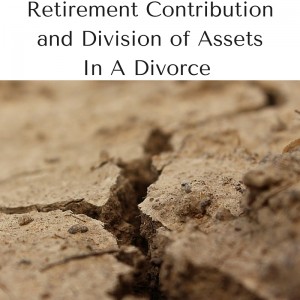The division of assets and debts is amongst the most frequently asked and complicated issue in most divorces. Often clients are confused as to what is meant by joint asset/debt and separate. The division is guided by general principles, case law, and equity or fairness in most cases. Simply put, those assets, which were brought to the marriage, will remain separate, absent contribution or maintenance by the other. Think of an IRA, which was owned pre-martial and is never contributed to by the other spouse. It should remain separate. However, monies placed into the account post marriage will be marital.
Accordingly, the question most frequently asked when contemplating a divorce is “whether or not I should continue contributing to my retirement?

Ultimately the answer to this question is a personal decision, but from a legal standpoint monies contributed during the marriage, and even after filing are arguably considered a marital asset.
How is the Task of Dividing Assets Completed?
Typically, retirement assets are divided in one of two ways; either through the use of a Qualified Domestic Relations Order (QDRO) or the divorce judgment, depending on what type of retirement the person/s have. Most attorneys utilize the services of a separate firm, which exclusively provides financial litigation support, and who insure the language of the domestic relations order complies with Internal Revenue Code requirements and is consistent with the intent of the Judgment of the divorce. Typically, costs range in the area of $250.00 or order, the costs of which are generally shared by the parties.
Retirement plans that fall under the QDRO must be honored by retirement plans that fall under the Employment Retirement Income Security Act, which includes 401(k) s and private pensions. Some types of federal, military, and state worker retirement plans are subject to special rules in the case of divorce.
It is frequently the case that a non-employee spouse is limited to the benefit of contribution to their spouse’s retirement for the period in which the couple was married. If the retirement asset was obtained prior to the marriage, a calculation of monies owed will be taken into account. This is not an easy process and again really is a case-by-case scenario, the type of plan, and the circumstances of the marriage all being taken into account.
Who will get which retirement funds? While carefully considering the pros and cons of each fund individually, consider the tax ramifications. A pre-tax account such as a 401(k) or 403(b) will not pay out the same as say a Roth IRA after Uncle Sam takes his share upon withdraw.
Divorce is never easy to accept no matter what the situation. So, don’t navigate through your divorce and face dividing retirement assets alone. Let Corriveau Law walk you through the entire process and learn more about the next steps in securing your future.
Retirement accounts and the family home are among the largest assets in a divorce proceeding. The stakes are high, and at Corriveau Law we will see to it that every penny counts.
Disclosure: All cases are driven by the facts unique to each case as they apply to the law at the time, and the persuasive argument of an attorney. The information we provide is meant only as a broad overview, and not to be relied on without speaking with legal representative



